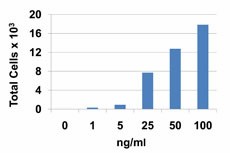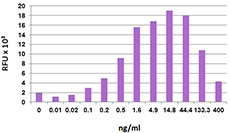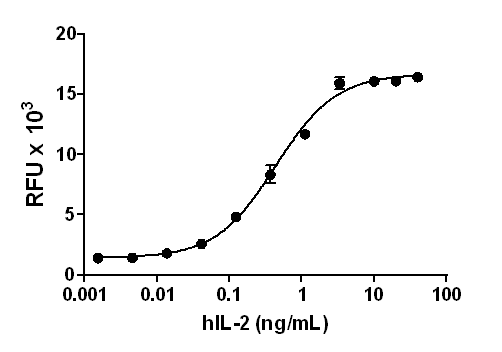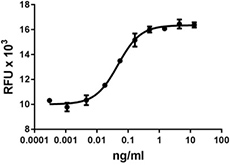- Regulatory Status
- RUO
- Other Names
- Macrophage derived cytokine (MDC), Small inducible cytokine subfamily A, member 22 (Scya22), stimulated T cell chemotactic protein (STCP-1)
- Ave. Rating
- Submit a Review
- Product Citations
- publications

-

Baf3-hCCR4 transfectants attracted by human CCL22.
| Cat # | Size | Price | Quantity Check Availability | Save | ||
|---|---|---|---|---|---|---|
| 584902 | 10 µg | 118€ | ||||
| 584904 | 25 µg | 203€ | ||||
CCL22 was initially cloned from human activated macrophages by random sequencing of cDNA clones. CCL22 was described originally as a constitutively produced, thymus-specific chemokine engaged in the recruitment of T cells. CCL22 and CCL17 bind to CCR4, and both chemokines share similar in vivo expression patterns and are closely linked on human chromosome 16; nevertheless, they are only 37% identical at the amino acid level.
CCL22 has been associated to different diseases such as allergen-induced lung inflammation, atopic dermatitis, and lymphoma. Also, high levels of CCL22 have been detected in the CNS in multiple sclerosis (MS) and experimental autoimmune encephalomyelitis (EAE). In addition, CCR4+ T cells have been linked to endotoxic shock, rheumatoid arthritis, T cell lymphoma, and autoimmune diabetes. Recruitment of Tregs to human cancers producing CCL22 suppresses tumor-specific T cell immunity and contributes to tumor growth. In the context of central nervous system, CCR4 is expressed in astrocytes, microglia, and in hippocampal neurons. Most recently, CCR4 and CCL22 have been detected in the anterior hypothalamus/preoptic area, a key region involved in thermogenesis. In this sense, it has been described that CCL22 is a prostaglandin-dependent pyrogen, acting in the anterior hypothalamus to induce hyperthermia via activation of brown adipose tissue.
Product Details
- Source
- Human CCL22, amino acids Gly25-Gln93 (Accession# NM_002990.4) was expressed in E.coli.
- Molecular Mass
- The 69 amino acid recombinant protein has a predicted molecular mass of approximately 8 kD. The DTT-reduced protein migrates at approximately 10 kD and non-reduced protein migrates at 11 kD by SDS-PAGE. The N-terminal amino acid is Glycine.
- Purity
- >98%, as determined by Coomassie stained SDS-PAGE.
- Formulation
- 0.22 µm filtered protein solution is in 0.1% TFA.
- Endotoxin Level
- Less than 0.01 ng per µg cytokine as determined by the LAL method.
- Concentration
- 10 and 25 µg sizes are bottled at 100 µg/mL.
- Storage & Handling
- Unopened vial can be stored between 2°C and 8°C for up to 2 weeks, at -20°C for up to six months, or at -70°C or colder until the expiration date. For maximum results, quick spin vial prior to opening. The protein can be aliquoted and stored at -20°C or colder. Stock solutions can also be prepared at 50 - 100 µg/mL in appropriate sterile buffer, carrier protein such as 0.2 - 1% BSA or HSA can be added when preparing the stock solution. Aliquots can be stored between 2°C and 8°C for up to one week and stored at -20°C or colder for up to 3 months. Avoid repeated freeze/thaw cycles.
- Activity
- Bioactivity was measured by its property to chemoattract BaF3-hCCR4 transfectants in a dose dependent manner.
- Application
-
Bioassay
- Application Notes
-
BioLegend carrier-free recombinant proteins provided in liquid format are shipped on blue-ice. Our comparison testing data indicates that when handled and stored as recommended, the liquid format has equal or better stability and shelf-life compared to commercially available lyophilized proteins after reconstitution. Our liquid proteins are verified in-house to maintain activity after shipping on blue ice and are backed by our 100% satisfaction guarantee. If you have any concerns, contact us at tech@biolegend.com.
- Product Citations
-
Antigen Details
- Structure
- Chemokine
- Distribution
-
Macrophages, NK cells, IFNγ stimulated human keratinocytes, thymic epithelial cells and intestinal epithelial cells
- Interaction
- Dendritic cells, NK cells, Th2 cells, T regs, CLA+ skin-homing memory/effector T cells
- Ligand/Receptor
- CCR4
- Biology Area
- Cell Biology, Signal Transduction
- Molecular Family
- Cytokines/Chemokines
- Antigen References
-
1. Godiska R, et al. 1997. J. Exp. Med. 185:1595.
2. Imai T, et al. 1998. J. Biol. Chem. 273:1774.
3. Yamashita U and Kuroda E. 2002. Crit. Rev. Immunol. 22:105.
4. Horikawa T, et al. 2002. Int. Immunol. 14:767.
5. Mailloux AW and Young MR, et al. 2009. J. Immunol. 182:2753.
6. Dogan RN, et al. 2011. J. Leukoc. Biol. 89:93.
7. Osborn O, et al. 2011. Cytokine 53:311. - Regulation
- CCL22 induces the migration of CCR4 + Th2 cells, Tregs, DC, and NK cells. It is induced by LPS and CD40 antibody in macrophages. It is upregulated by Th2 cytokines (IL-4 and IL-5) and downregulated by Th1 cytokines (IFNγ).
- Gene ID
- 6367 View all products for this Gene ID
- UniProt
- View information about CCL22 on UniProt.org
Related FAQs
- Why choose BioLegend recombinant proteins?
-
• Each lot of product is quality-tested for bioactivity as indicated on the data sheet.
• Greater than 95% Purity or higher, tested on every lot of product.
• 100% Satisfaction Guarantee for quality performance, stability, and consistency.
• Ready-to-use liquid format saves time and reduces challenges associated with reconstitution.
• Bulk and customization available. Contact us.
• Learn more about our Recombinant Proteins. - How does the activity of your recombinant proteins compare to competitors?
-
We quality control each and every lot of recombinant protein. Not only do we check its bioactivity, but we also compare it against other commercially available recombinant proteins. We make sure each recombinant protein’s activity is at least as good as or better than the competition’s. In order to provide you with the best possible product, we ensure that our testing process is rigorous and thorough. If you’re curious and eager to make the switch to BioLegend recombinants, contact your sales representative today!
- What is the specific activity or ED50 of my recombinant protein?
-
The specific activity range of the protein is indicated on the product datasheets. Because the exact activity values on a per unit basis can largely fluctuate depending on a number of factors, including the nature of the assay, cell density, age of cells/passage number, culture media used, and end user technique, the specific activity is best defined as a range and we guarantee the specific activity of all our lots will be within the range indicated on the datasheet. Please note this only applies to recombinants labeled for use in bioassays. ELISA standard recombinant proteins are not recommended for bioassay usage as they are not tested for these applications.
- Have your recombinants been tested for stability?
-
Our testing shows that the recombinant proteins are able to withstand room temperature for a week without losing activity. In addition the recombinant proteins were also found to withstand four cycles of freeze and thaw without losing activity.
- Does specific activity of a recombinant protein vary between lots?
-
Specific activity will vary for each lot and for the type of experiment that is done to validate it, but all passed lots will have activity within the established ED50 range for the product and we guarantee that our products will have lot-to-lot consistency. Please conduct an experiment-specific validation to find the optimal ED50 for your system.
- How do you convert activity as an ED50 in ng/ml to a specific activity in Units/mg?
-
Use formula Specific activity (Units/mg) = 10^6/ ED50 (ng/mL)
 Login / Register
Login / Register 














Follow Us